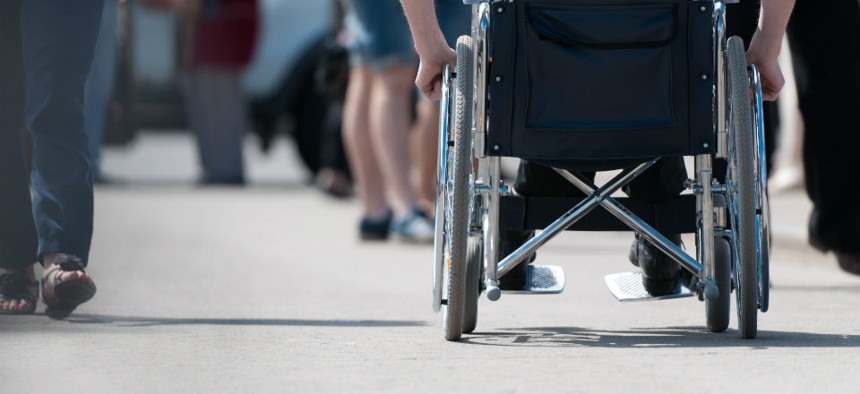
Konstantin Yolshin/Shutterstock.com
When Disability Is in the Eye of the Beholder
The diary of a teacher who learns an inspirational lesson.
“So often, the students you’re trying to inspire are the ones that end up inspiring you.” Educator Sean Junkins said that, and he was right.
As a teacher at the Federal Executive Institute, I am always inspired by my students—by their stories, commitment and passion. But I’ve never been inspired and taught more by any one student than I was by Jamie Kendall, director of special projects at the Health and Human Services Department's Center on Disability and Aging.
The evening before classes began, I joined the participants and facilitators for dinner. “I just want you to know that Jamie is in your class,” one of the facilitators told me, “but don’t worry, she will help you more than you will help her.”
Jamie is a very small woman who uses a wheelchair to navigate life due to brittle bones disease, or more officially known as osteogenesis imperfecta.
I admit I was nervous about having her in my class. A lot of my teaching is about presence—using posture to show up fully on the platform. No slouching allowed. The purpose is to help students become totally present, displaying both confidence and openness. It requires a lot of coaching for many students. How was I going to talk about this when one of my students was in a wheelchair? How was I going to coach platform movement? How could I use the words “be tall”?
I approached Jamie during dinner, introduced myself as her instructor and admitted to a little apprehension about making sure that I treated her in a respectful way. “Shirley, thank you,” she said. “But it is my job to teach you how to teach me. And don’t go easy on me.”
In class we get acquainted with brief presentations in an inclusive, nonthreatening environment. When it was Jamie’s turn to present, I suggested she be a bit taller. We both laughed as she moved to the front of her chair, claiming a stronger presence. Lifting her head high and her sights even higher, she transformed before our eyes. She quickly learned to use wheelchair movement for emphasis and a way to connect with the audience.
Jamie does not see herself as requiring special attention. She is adamant about how blessed her life is. She has a job she loves, a home, a car, friends and children.
At HHS, Jamie helps others see the assets, skills and abilities of people with disabilities. She knows that many are missing out because hiring managers don’t understand that people with disabilities are valuable contributors.
Jamie and her husband, who has the same disease, became foster parents several years ago and eventually adopted two children. One son is grown and has joined the military. The other is 16. “Both are physically abled, and they see us a normal,” she said.
Jamie told me stories that would have been heart-breaking if she didn’t make them so funny.
One time when Jamie was waiting outside a church—in her bridesmaid dress—a passerby mistook her for a homeless person and offered her money. Another time, a mugger approached her car, pointing a gun and demanding her purse. After quite a bit of maneuvering, the mugger shouted, “Hurry up!” She yelled back, “This is hurrying for me!”
But Jamie became serious when telling about a stressful day at the store after a woman followed her to her car and said, “I was having such a bad day and feeling sorry for myself, but seeing you makes me realize how lucky I am.” This kind of attitude misses the whole point about who a person is, Jamie noted. “I have a really good life," she said. "But because we are all icebergs people only see the top of us. She made an assumption about my life."
Jamie's message: Having a disability is not a bad thing. It’s an experience. We are more alike than we are different. Like all people, we are witty and dull, short and tall, skinny and not so skinny, grumpy and happy. All southerners are not alike, all minorities are not alike—although sometimes we are lumped together.
If your behavior toward another human being, no matter their circumstances, comes from a place of respect, you will not mess up in your interactions with them. I’m thankful that Jamie taught me some valuable lessons about what it is to be human.
Who do you need to thank for similar lessons?
Shirley Garrett is a writer and adjunct faculty member at the Federal Executive Institute, where she teaches presentation and communication skills. She is the author of A Tap Water Girl in a Bottled Water World.
(Image via Konstantin Yolshin/Shutterstock.com)
NEXT STORY: America Will Miss Obama When He's Gone






